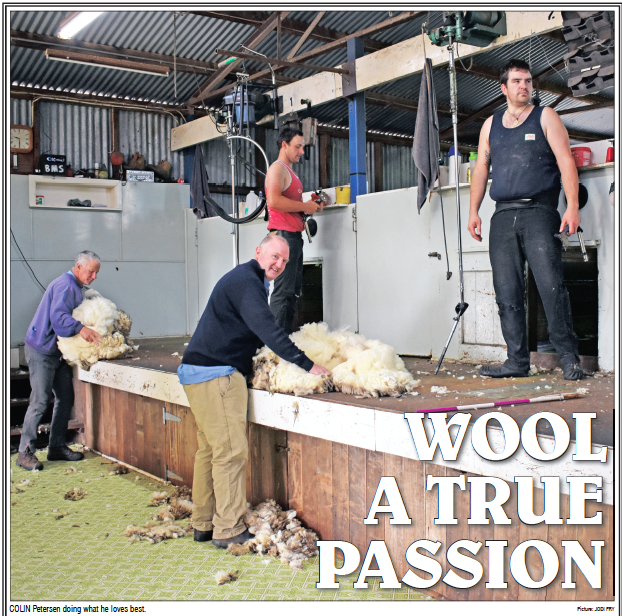Published in the Western District Farmer
Written by Jodi Fry

FOR Colin Petersen, the wool industry is a true passion.
With over thirty years ‘in the game,’ Colin has both experience and expertise.
Colin has a quiet and humble demeanour but also an underlying determination and pride. He would dodge the limelight as if it were bullets – so, this interview takes him a long-way from what would be naturally comfortable for him, but his work life story is a good one to tell.
Colin first moved to Macarthur when he was 14 and attended Hamilton Technical school.
Work experience was completed in Macarthur with the late Alec Dalton and his wife Lois – where Alec was the local wool buyer. Not only had Colin found a career path, but Alec Dalton was to became Colin’s boss, business partner, mentor and life-long, respected friend.
With schooling complete, Colin took up a position buying and selling wool with Alec. This lasted for four years and during the quiet patches with Alec, he would head to Hamilton and work with Rupert Tannock.
Colin, without hesitation, credits Alec with being the greatest influence on his career – teaching him so much, particularly during those early years.
“We used to spend a lot of time in the truck, so we would just talk about things. He taught me how to do business with people – I was pretty quiet and not really comfortable with that – he sort of, just got me up and at it – he really helped me out a lot – we had a hell of a lot of good times, but he was always there for me.”
Alec went on to sell the business to Carters, and Colin went working with Rupert in Hamilton. Then at the age of 22, an opportunity arose to start a new wool business in Macarthur.
Colin formed a business partnership with friend Anthony Kelly, and Pekel Wool opened for business in the old butter factory. Through all of this Alec Dalton was never far away – the business mentor; helping the younger ones make a solid start.
Pekel Wool grew into a sound and strong business and continued to trade for many years but the wool broking game was changing. Smaller companies began feeling the squeeze as bigger companies began taking them over.
It got to a stage that where the competition was too great and Pekel Wool sold out to Itochu and T.W. Greens. It was at this time that Anthony had decided on a career change, but Colin stayed on under the new banner.
After a few years, there were changes afoot in the industry again, and eventually this forced Itochu and T.W Greens into a business restructure. Ultimately, they were going to sell off the Macarthur branch – so Colin bought it back.
This time Colin was working for himself and he did this until he was approached by Fox and Lillie Rural, around seven years ago. This was a fit too good to refuse. The company is a family- based business that has been in operation for over 70 years.
So now Colin has a team, and although he managers the Hamilton and Casterton branches, he can get back to what he loves most – managing wool clips with the producers.
There has been a lot of changes in the wool industry over the last 30 years.
“There was a lot more sheep back in my early days and a lot more wool. The current market is strong but it still couldn’t handle the numbers that we used to produce. micron quantity has shifted with a lot more 17 and 18 micron and finer merino wool in the market now, not like there was in the past. And there is still a lot of demand for the mid micron merino wool and this has been pretty stable for quite a long time.”
As for where the wool industry is heading – Colin see’s the influence of the environmentally conscious consumer playing an even greater part.
The ‘provenance of wool’ – where the consumer can actively trace the wool from the tangible piece of clothing back to the farm where the wool is produced – has become a huge marketing tool, but one that has been consumer driven.
The modern consumer is looking to purchase clothes that have been manufactured using ethical and sustainable practices and using natural fibres. Colin see’s the market continuing to grow in this direction.
“There will always be the high-end market but the real growth is in clothing that makes people feel good about wearing it.”
These woollen clothes are becoming much more readily available to the average consumer. There has been a huge expansion into the active wear and under wear market and a lot of these manufacturers are basing their businesses online.
Colin explained that the industry needs young people. “There so many aspects to the trade whether that be at the producer end or in the export, accounting, storage and logistics and there are traineeships available through Fox and Lillie Rural – it’s a great career path.”
Colin has been on a few trips abroad with work and his last trip was to China – celebrating the Fox and Lillie’s 70th year in business.
He went to the factories to see the wool go through various production stages before it is combed into ‘tops’ – before being processed into yarn and then going on to be woven into various types of fabric.
Colin says he has met some great people in this industry over the last 30 plus years, in a job that he clearly loves.
“The jobs been good to me,” but I think Colin is good for the job!
